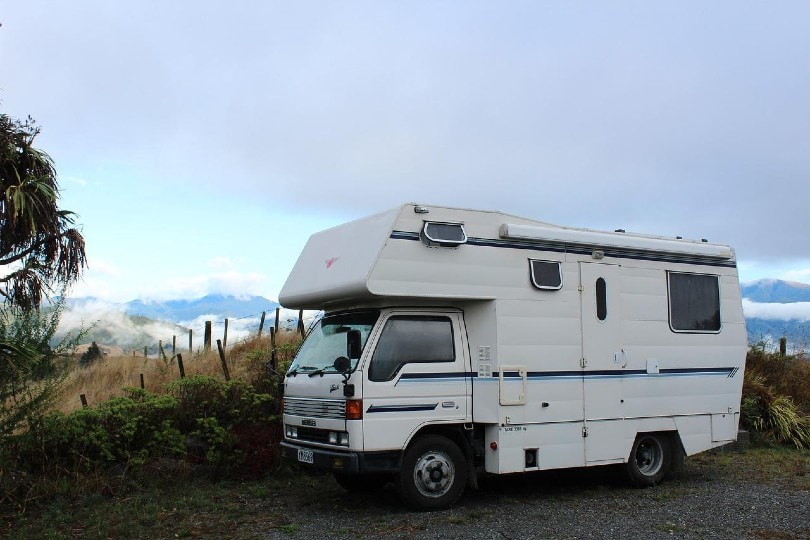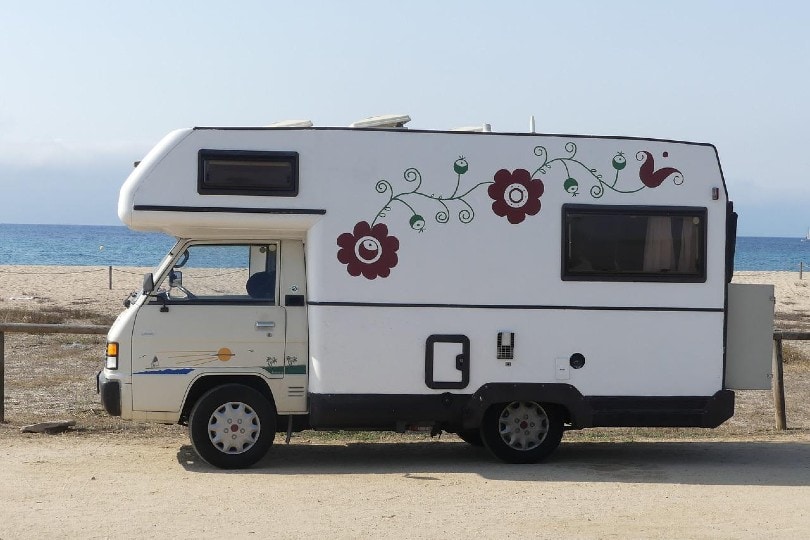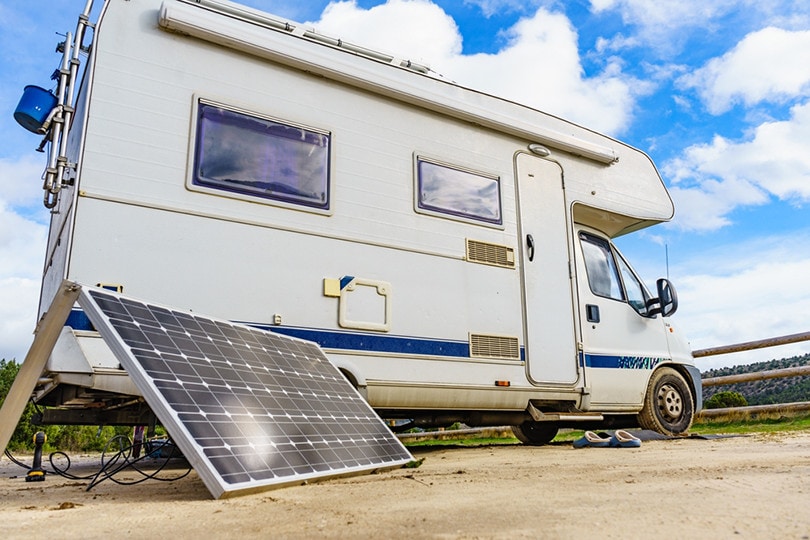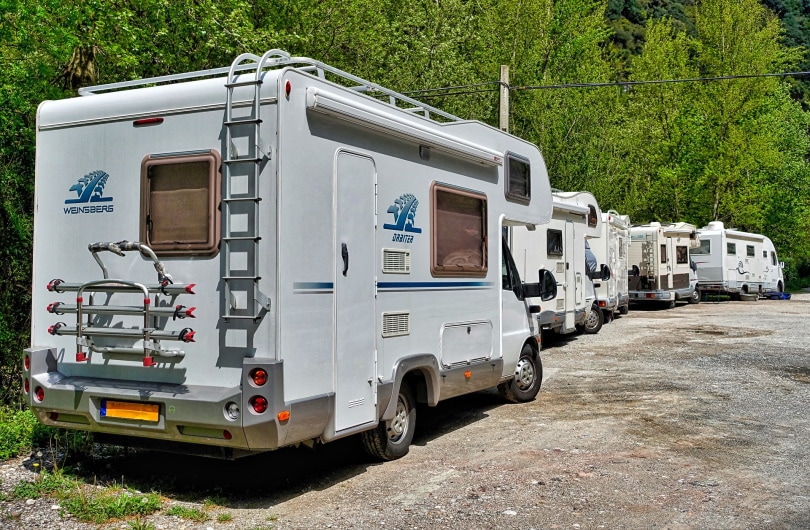Can You Park an RV on the Street? Laws, Facts & FAQ
-
Kristin Hitchcock
- Last updated:

RV laws vary widely between areas. Some states have no laws governing where RVs can be parked, while others don’t allow RVs to park on certain streets. Before you head off to a new state, it is vital to know about its specific laws. After all, it’s those laws you’ll have to worry about while traveling.
Types of RV Parking Laws
There are a few main types of laws you’ll find in different states. While the specifics of these laws do vary, they also have some similarities. Here are some situations you may run into when trying to park your RV:

Residential Street Parking
You’ll often find laws that specifically govern parking on a residential street. These are streets that mostly contain other homes. Even if you have permission from one of the homeowners (such as commonly occurs when visiting a friend), you can’t always park on the street.
Typically, parking an RV on a street is usually governed by one of the following laws, depending on where you live.
1. Permit Required
In states that do allow RV parking on residential streets, you usually need a permit that states that you can park your RV on a street. These permits cost varying amounts of money. Plus, there is usually a set timeframe that you’re allowed to park there. Sometimes, you have to pay per day, so keep this in mind when planning your trip.
Practically none of these permits allow you to park on a street for more than a few months. Therefore, you cannot simply leave your RV on a street. For instance, many cities in California state that you can only purchase 72 days for residential street parking. These permits are completely temporary.
2. No Parking Allowed
Other areas don’t allow residential parking at all. Usually, cities either allow parking with a permit or not at all. If you find yourself in an area where residential parking is illegal, you’ll need to find a different spot to park your RV. Fines can often be heavy, and your RV can be impounded on some occasions. Therefore, we recommend avoiding parking on the street in these areas.
Luckily, if you own the property, you can often park your RV there. However, HOAs can sometimes come into question if you park an RV on your land for an extended period. With that said, HOAs are different than the law. Usually, they have very little enforcement ability, though this can differ depending on the area.
Often, these laws specifically state that the RV cannot obstruct a sidewalk or enter your neighbor’s property, but you may park it anywhere on your property.

Rest Stop Parking
Often, you’ll likely stop at a rest stop at some point on your trip. However, the laws on parking overnight at a rest stop differ. While these laws are not always enforced, they can get you in a decent amount of trouble if you ignore them. Therefore, these laws are important to read and understand, as well.
The laws in this category differ widely. Some states don’t have laws at all, while others specify specific stay lengths.
- Texas: No stays allowed over 24 hours. You can also not erect a shelter, booth, or structure at the rest area, so you may be unable to extend your RV to full size.
- Utah: Usually, no overnight stays are permitted but some rest stops sell permits for overnight stays, which are regulated by the local staff.
- Colorado: No parking or overnight stays allowed at all.
- Nebraska: RVs can only be parked at a rest stop for 10 hours. Furthermore, you cannot park overnight, even if you technically do not stay for longer than 10 hours.
- Minnesota: Everyone is only allowed to stay at a rest stop for 4 hours no matter what you’re driving. However, the law also specifies that this must be posted, so it may not apply to all rest stops.
So, Where Can I Park My RV?
There are several free places where you may be able to park your RV. On top of paid campgrounds and other paid areas, you may be able to find these free locations on your trip.
Casinos commonly allow overnight parking but the exact policies vary from casino to casino. You can call ahead to ask about their policies. Some may require you to make a purchase or gamble while you are there. Others may require you to pay a small price for parking if you aren’t using the amenities. Once you get there, it is best to go inside and tell the front desk about your intentions.
Checking in helps ensure that they are okay with your parking and prevents the police from knocking on your door.
Another area where most RVs park for free is a private home. If you have a friend in the area, you may ask them to borrow their driveway for a bit. However, some areas do not allow this, especially if there are HOAs involved. Sometimes, a specific time limit is presented.
For long-term RV parking options, you’ll need to pay at a campground or similar site. Most areas will not allow RVs to park for a long period without some sort of payment.

Is it Cheaper to Live in an RV than in a Home?
There is a lot of debate on whether or not an RV is cheaper than a home. In all likelihood, it depends on where you’re located. In many cases, an RV suitable for your usage will be about $50,000 on the pricy side. However, you can find used options even cheaper.
If you’re living in an RV, then you’ll likely want it to have all the amenities of a home, including a bedroom and a bathroom. Of course, this will be a bit more expensive than a smaller RV.
On top of the RV, you’ll need to purchase a plot of land. On the other hand, you could keep your RV at a campground instead. However, this will cost more money in the long run. A small plot of land will cost you a few thousand dollars, depending on where you live.
You’ll also need to invest in utility hookups. Usually, this will cost you $10,000 to $30,000 for the hookups alone. However, it may cost more if utilities are further away and you need to pay the company to spread it out further.
With that said, some RVs cost more than a house. For this reason, it all depends on how much you’re willing to spend.
Conclusion
The laws that surround parking RVs vary widely. There are different laws depending on the area. Some areas are extremely strict when it comes to RV parking, while others hardly have any laws at all. For this reason, we highly recommend that you make yourself familiar with your local laws before you consider parking your RV.
Sometimes, a permit is required for parking. There are very few places that allow free parking, even if it is owned by the state.
- https://www.motorbiscuit.com/buying-an-rv-and-land-is-cheaper-than-buying-a-house/
- https://www.godownsize.com/motorhome-parked-on-street/
- https://drivinvibin.com/2021/02/14/legal-to-sleep-in-your-rv/
- https://www.cruiseamerica.com/rv-adventures/rv-lifestyle/rv-parking-regulations-by-state
Featured Image Credit: VictorMacGill, Pixabay
Contents
